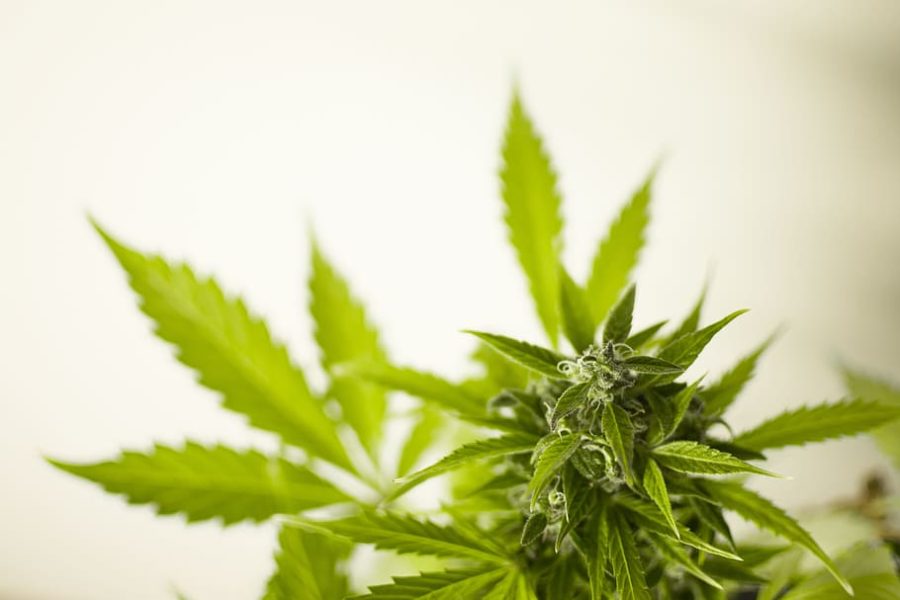The history and impact of marijuana incarceration on minority communities
April 20, 2022
“You aren’t going to go arrest the people on Wall Street for their powder cocaine; It’s done behind closed doors, and they can afford a good lawyer,” said Chuck Reasons, law and justice professor.
“Much easier to crack down on the marijuana deals on the open street corner, and they can’t afford a lawyer,” said Reasons on the incarceration of marijuana users.
The U.S. has the highest prison population in the world due to a sharp incline that started in the 1970s and skyrocketed in the 1980s, according to the World Atlas. The prison population grew to be, and continues to be, disproportionately non-white according to date collected by the U.S. Census and the Federal Bureau of Prisons.
Reasons said the steep incline in incarceration was due to the war on drugs, including marijuana.
The history of the war on drugs
Reasons said former President Richard Nixon’s administration began the war on drugs in order to target minority groups and demographics that could vote against him by putting them in prisons for drug-related offenses.
Nixon first formally declared a war on drugs in 1971 and would coin the term in a message to congress where he lined out his campaign goals, according to Britannica. Nixon said this campaign was directed towards eradication, interdiction and incarceration.
Nixon would later form the Drug Enforcement Administration by merging several smaller cabinets that had been aimed at drug control, including the Bureau of Narcotics and Dangerous Drugs and the Office of Narcotics Intelligence, according to Britannica.
Nixon’s Domestic Affairs Cabinet Member, John Ehrlichman, said to Harper’s Magazine the Nixon administration had “two enemies: the antiwar left and Black people. … We knew we couldn’t make it illegal to be either against the war or black, but by getting the public to associate the hippies with marijuana and Blacks with heroin, and then criminalizing both heavily, we could disrupt those communities.”
Reasons said the history of drug criminalization to target minority communities in the U.S. can be tracked all the way back to 1914, when opium was criminalized to incarcerate Chinese immigrants due to fears they would take working class jobs.
Reasons said around this time, marijuana was most often associated with Latin Americans and not with Black Americans. A shift occurred in the ‘60s and ‘70s where marijuana and general drug use became more associated with Black Americans, according to Reasons.
Reasons said criminalizing marijuana and other substances prevalent in low income and urban areas would mean incarcerating people that could vote against Nixon, and later, Reagan.
Prisoners cannot vote, and in many states, felons have their right to vote revoked permanently, according to Reasons. There are other liberties withheld from these groups after being incarcerated as well, ranging from welfare eligibility to the ability to possess firearms, according to Reasons.
Reasons said another political benefit from the war on drugs was that it was an easy campaign issue. Reasons cited Nixon’s hot button issue on the topic during his initial campaigning, how Former President Ronald Reagan continued this by passing the Anti-Drug Abuse Act and how Former President Bill Clinton passed the Mandatory Minimum Act as examples of the continuity of presidents being hard on drugs at the end of the 20th century.
Disparities in demographics
Reasons explained the cause for the disparity in how certain drugs are enforced versus others is due to who is using them.
Reasons said that harsher laws and legislation are made for drugs such as marijuana because they are associated with the lower class. Drugs used by higher status figures like politicians, movie stars and executives have lower repercussions and aren’t enforced as harshly, and often had lower prison sentences in the event that a public figure was caught in possession, according to Reasons.
Reasons recounted one instance where Nebraska, a state known for conservative views on drug use, amended the law so those caught in possession could get education rather than go to jail. While appealing in theory, this may have been done only for ulterior motives, according to Reasons.
“It turns out that only happened because the state’s attorney general’s son was caught smoking marijuana, so again it’s about power and who’s using what drugs,” Reasons said.
According to Forbes, there are approximately 40,000 Americans still in prison for marijuana related offenses in states where marijuana use is now legal.
Despite a record high 68% of Americans supporting federal legalization of marijuana according to the U.S. Census Bureau, Reasons still thinks that federal legalization could be far away.
“I’d like to see it in my lifetime,” Reasons said. “I think, hopefully, that it could be 10 years out from now.”
Going forward
Reasons said that as marijuana use increases in popularity and becomes less stigmatized, marijuana criminalization seems like a thing of the past, but it still continues. According to the FBI’s Drug Bureau statistics, in 2018 there was a drug related arrest every 20 seconds.
According to Forbes, there was a marijuana related arrest every 58 seconds, and 92% of those marijuana arrests are possession charges while only 8% of those arrests involve illegal trade, such as Reason’s example of growing without a permit.
According to Reasons, “retroactivity” is a contentious issue in legal spaces. “Retroactivity” is pardoning those who have been convicted of a crime that is now legal, in this instance marijuana possession in states where it is now legal.
“One argument against [retroactivity] is that you do the crime you do the time,” Reasons said. “These people did something illegal, and they need to serve their time. On the other hand, some argue this isn’t justice. These people are still being punished for something that we have decided was never wrong, and it isn’t just.”

